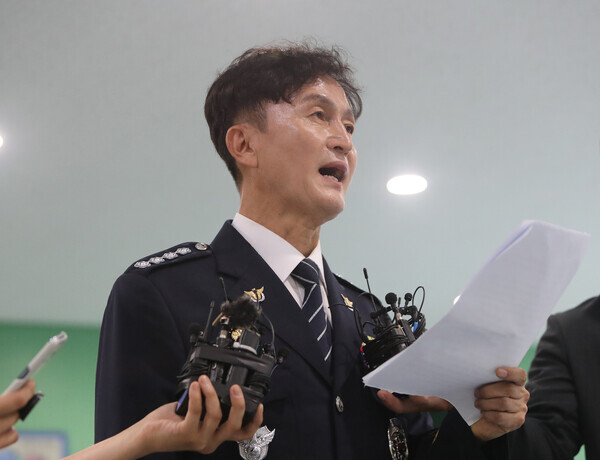hankyoreh
Links to other country sites 다른 나라 사이트 링크
[Editorial] Reprisals for protesting police give window into Yoon’s tightening grip

After chiefs of police stations around the country held a meeting to oppose the founding of a police bureau within the Ministry of the Interior and Safety, the National Police Agency (NPA) put Ryu Sam-yeong, the Ulsan Jungbu Police Station chief who organized the meeting, on stand-by, setting out to inspect and take disciplinary action against 56 in-person participants of the meeting. The presidential chief of staff, Kim Dae-ki, even designated the police station chiefs’ meeting as “inappropriate."
After turning a blind eye to concerns about the erosion of the police’s political neutrality, the NPA mobilized its authority over personnel issues to block any more discussion of the matter.
The meeting of the nation’s police station chiefs held at the Police Human Resources Development Institute in Asan, South Chungcheong Province, on Saturday was attended by 189 police officers of the rank of senior superintendent in person and virtually. With the Interior Ministry speeding up efforts to gain direct control over the police, these officers had gathered together to discuss the situation publicly.
Participants of the meeting reportedly came to the conclusion that “the founding of a police bureau and the institutionalization of administrative control in the form of command regulation legislation are historical regressions” and that “more time for deliberation is needed for the formulation of social consensus.”
After scheduling to receive a report of the meeting’s outcome, NPA commissioner general nominee Yoon Hee-keun suddenly ordered the meeting to be broken up while it was still ongoing, warning of extensive disciplinary action against participants. Many believe what prompted this was pressure from higher-ups such as Interior Minister Lee Sang-min.
Another controversial point is the apparent double standard applied to prosecutors. Despite multiple national meetings by prosecutors ranging in rank from chief prosecutor to junior prosecutor, prosecutors have never been penalized for holding meetings. Regarding their group action in response to recent efforts for prosecutorial reform, Justice Minister Han Dong-hoon said, “As people in charge of the situation at the scene, [prosecutors] have the duty to speak up when a wrongful law is passed through wrongful procedure.” Of course, prosecutors can’t be the only ones possessing this “duty to speak up.”
The police are the only group that can exert direct physical force on the public in the name of “public order.” This is why the NPA broke off from the Interior Ministry’s National Security Headquarters in 1991, and why the National Police Commission is tasked with overseeing the police. The fact that high-ranking police officers of the rank of senior superintendent who are in charge of public order on the ground spoke up directly attests to how reasonable and desperately needed the neutrality of the police is.
Yoon’s rush to discipline these officers can only be explained as an attempt to “domesticate” the police.
Kim said on Saturday, “The police may become the most powerful agency due to prosecutorial reforms, so I think checks and balances are necessary,” expressing his support for the founding of a police bureau. This is but a sophism arguing for the reversal of the history of democratic control of the police of the past 30 years. The criticism that extensive disciplinary action against participants of the police station chiefs’ meeting amounts to a preview of the “domination of the police” by those in power should be taken heed of.
Please direct questions or comments to [english@hani.co.kr]

Editorial・opinion
![[Column] Life on our Trisolaris [Column] Life on our Trisolaris](https://flexible.img.hani.co.kr/flexible/normal/500/300/imgdb/original/2024/0505/4817148682278544.jpg) [Column] Life on our Trisolaris
[Column] Life on our Trisolaris![[Editorial] Penalties for airing allegations against Korea’s first lady endanger free press [Editorial] Penalties for airing allegations against Korea’s first lady endanger free press](https://flexible.img.hani.co.kr/flexible/normal/500/300/imgdb/original/2024/0502/1817146398095106.jpg) [Editorial] Penalties for airing allegations against Korea’s first lady endanger free press
[Editorial] Penalties for airing allegations against Korea’s first lady endanger free press- [Editorial] Yoon must halt procurement of SM-3 interceptor missiles
- [Guest essay] Maybe Korea’s rapid population decline is an opportunity, not a crisis
- [Column] Can Yoon steer diplomacy with Russia, China back on track?
- [Column] Season 2 of special prosecutor probe may be coming to Korea soon
- [Column] Park Geun-hye déjà vu in Yoon Suk-yeol
- [Editorial] New weight of N. Korea’s nuclear threats makes dialogue all the more urgent
- [Guest essay] The real reason Korea’s new right wants to dub Rhee a founding father
- [Column] ‘Choson’: Is it time we start referring to N. Korea in its own terms?
Most viewed articles
- 160% of young Koreans see no need to have kids after marriage
- 2New sex-ed guidelines forbid teaching about homosexuality
- 3[Column] Life on our Trisolaris
- 4OECD upgrades Korea’s growth forecast from 2.2% to 2.6%
- 5Hybe-Ador dispute shines light on pervasive issues behind K-pop’s tidy facade
- 6Months and months of overdue wages are pushing migrant workers in Korea into debt
- 7S. Korea discusses participation in defense development with AUKUS alliance
- 8Presidential office warns of veto in response to opposition passing special counsel probe act
- 9[Reporter’s notebook] In Min’s world, she’s the artist — and NewJeans is her art
- 10[Editorial] Penalties for airing allegations against Korea’s first lady endanger free press